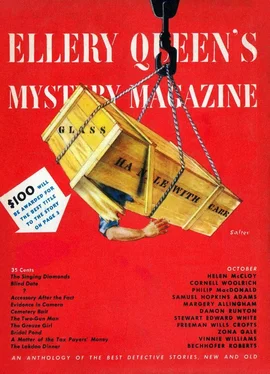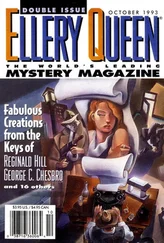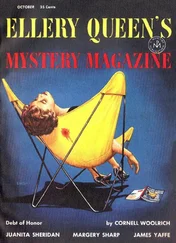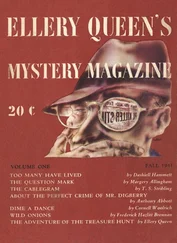Марджери Аллингем - Ellery Queen’s Mystery Magazine. Vol. 14, No. 71, October 1949
Здесь есть возможность читать онлайн «Марджери Аллингем - Ellery Queen’s Mystery Magazine. Vol. 14, No. 71, October 1949» весь текст электронной книги совершенно бесплатно (целиком полную версию без сокращений). В некоторых случаях можно слушать аудио, скачать через торрент в формате fb2 и присутствует краткое содержание. Город: New York, Год выпуска: 1949, Издательство: The American Mercury, Жанр: Классический детектив, на английском языке. Описание произведения, (предисловие) а так же отзывы посетителей доступны на портале библиотеки ЛибКат.
- Название:Ellery Queen’s Mystery Magazine. Vol. 14, No. 71, October 1949
- Автор:
- Издательство:The American Mercury
- Жанр:
- Год:1949
- Город:New York
- ISBN:нет данных
- Рейтинг книги:5 / 5. Голосов: 1
-
Избранное:Добавить в избранное
- Отзывы:
-
Ваша оценка:
- 100
- 1
- 2
- 3
- 4
- 5
Ellery Queen’s Mystery Magazine. Vol. 14, No. 71, October 1949: краткое содержание, описание и аннотация
Предлагаем к чтению аннотацию, описание, краткое содержание или предисловие (зависит от того, что написал сам автор книги «Ellery Queen’s Mystery Magazine. Vol. 14, No. 71, October 1949»). Если вы не нашли необходимую информацию о книге — напишите в комментариях, мы постараемся отыскать её.
Ellery Queen’s Mystery Magazine. Vol. 14, No. 71, October 1949 — читать онлайн бесплатно полную книгу (весь текст) целиком
Ниже представлен текст книги, разбитый по страницам. Система сохранения места последней прочитанной страницы, позволяет с удобством читать онлайн бесплатно книгу «Ellery Queen’s Mystery Magazine. Vol. 14, No. 71, October 1949», без необходимости каждый раз заново искать на чём Вы остановились. Поставьте закладку, и сможете в любой момент перейти на страницу, на которой закончили чтение.
Интервал:
Закладка:
by Samuel Hopkins Adams
It was the most open-and-shut case in my police experience. We had everything — corpse, motive, murderer, and a man on the spot at the time. And what was the result? A complete washout.
You remember the West Sixteenth tenement murder last fall, the one the newspapers headlined as the Millionaire Beggar Mystery. I figured on being in those headlines myself. Detective Casey Lane Solves Millionaire Beggar Mystery. And look at me now! I might as well give my badge to Aunt Minnie.
Old Hans Gommer wasn’t any millionaire. But he’d made enough out of forty years’ street begging to own the tenement. He kept it up decently, too; otherwise Marian and I wouldn’t be living there. His room was at the stairhead, second floor, same floor as our apartment. It was a single room. And I mean single; not even a toilet; just a stove, a bed, a stand, a couple of chairs, and a few cooking gadgets. The windows were barred with fixed half-inch iron, five inches apart. The old miser was jittery about being robbed. His door was like a bank vault’s.
He hadn’t a friend in the world, unless you count a big snarly brindled tomcat that used to crawl the narrow ledge along the wall, squeeze through the bars, and beg for what was left of dinner, and little enough of that, I guess. Old Hans had a relative, though, an ugly little wizened devil of fifty or sixty — you couldn’t tell — who used to come in two or three times a week for an unfriendly game of backgammon. His name was Finney, and we found out afterward he was a disbarred lawyer from somewhere out West. When the door was open in summer, you could hear the pair of ’em growling and cursing and swapping charges of crooked play. True, too, I wouldn’t wonder.
The door wasn’t open this Monday evening. It was cold and rainy. My wife had been busy all day organizing a floor-by-floor bond campaign with a barrier across the foot of the stairs so no tenant could get past without buying. She and Ma Sanderson were on guard from five o’clock on. At half-past, old Gommer went out and came back with a flounder tied up in paper, to cook for his dinner, and Marian sold him a twenty-five-cent stamp. That was his limit. An hour later Peter Finney, the nephew, knocked on the door and was let in earlier than he usually came, though if he expected to get a meal out of it, he was a fool.
Maybe they quarreled over that. Maybe over the game. Anyway, Finney stabbed Hans expertly through the spinal cord, and what happened in the next three hours the Police Department is still arguing. All but me.
Don’t forget that all this time either my wife or Ma Sanderson, or both, were on the barrier looking right up to old Gommer’s door. Even a cockroach couldn’t have got in or out without being spotted.
It was half-past nine and I was smoking my pipe and jollying with the two females at the foot of the stairs when Finney showed up above us.
“Uncle Hans is dead,” he said. He was white but cool enough.
The door hadn’t sprung shut. We all ran up and went in. The old boy was dead all right, with a neat hole in the back of his neck, so small you could hardly see it through the fuzz of gray hair. He was in his chair, half slumped over the table. The checkers and dice were scattered over the floor. I put it to Finney.
“Who did it?”
“I don’t know.”
“Why don’t you know? You’ve been here all the time.”
You never saw a fishier eye than the one he gave me. “I was asleep,” he said.
I turned to the two women. “Could anyone else have got in here since this man came?”
“No.” Both spoke at once.
“Could anyone have got out?”
“Absolutely not,” Ma Sanderson answered. But my wife qualified with, “Unless those window bars are movable.”
I tried them. They were solid.
“I guess that puts it up to you,” I told Finney. “Where’s the knife?”
“I don’t know.”
Well, I ought to have called Headquarters, but I figured that, being Johnny-on-the-spot, here was my chance of glory.
“I saw old Gommer having one of these narrow-bladed little fish knives ground by a street grinder one day,” Ma Sanderson put in.
“That’s it,” I said. “We’ll find it.”
First I frisked Finney. He hadn’t so much as a penknife on him. Then the three of us fine-tooth-combed the room. Not a sticker of any sort. That left the window as the only answer. Fifteen feet opposite was a blank wall. Far as it could be thrown, the knife would have to drop into the little backyard. I gave Marian my gun to guard Finney and went down with my flash. No knife. And no footprints in the soft ground, proving that nobody had happened by and picked up the knife.
“It’s got to be in this room,” I said.
So I went through Finney again and the three of us turned the place inside out and made a detailed inventory of everything in it. It was then that my wife said:
“I wish Aunt Minnie was here.”
Aunt Minnie was her old school-marm at No. 18, now living on the top floor of our tenement. But she was on a visit.
“You can have Aunt Minnie,” I said. “I’ll take Headquarters.” So I phoned.
Then I went after Finney again.
“You killed him.”
“I did not. What would I want to kill him for?”
“You’re his heir, aren’t you?” Marian said.
“I guess so. But I didn’t kill him.”
“Now, listen,” I said. “You got into a stink over your game of backgammon and maybe he made a crack about you cheating and you let him have it. If you didn’t, who did?”
“That’s for you to find out,” he said.
Then the Headquarters push came in and did everything over again with the same result. They took Finney with them when they quit, leaving us with only one new fact: the old man had probably been dead about three hours. So he must have been killed shortly after Finney arrived — which got us a lot nearer nothing.
“I do wish Aunt Minnie was here,” my wife said.
“What would she do that we haven’t?” I growled.
“Aunt Minnie’d find something we’ve overlooked,” Marian said. “There was never a trick played in school but what she caught the funny boy that did it.”
“Anyway,” I said, “we’ve got the guy, if we haven’t got the knife. It’s a watertight case for the D. A.’s office.”
The district attorney didn’t see it in that light. “Find me the knife,” he said, “and I’ll put him in the chair. But you can’t convict a man of murder because nobody else did it.”
“That’s what Aunt Minnie says,” said my wife when I told her the case was at a standstill a week later. “I had a letter from her. She’ll be back next week.”
When the old dame arrived, she had us up in her room and listened to Marian and Ma Sanderson and me.
“Where’s Finney?” she asked.
“Out of jail. He got a lawyer who sprung him.”
“Have you got that inventory you made?”
I handed her a copy. She studied it. “Is this everything that was in the room at the time?”
“I’ll swear to that,” Marian said. “So will I,” said Ma.
“You spoke of the old man bringing in a fish in a parcel.”
“That’s right.”
“Where’s the fish?” she asked.
“He ate it, I suppose.”
“Did he eat the bones? I don’t see ’em here.”
Marian and Ma and I looked at the inventory.
“You’ve got the wrapper down: ‘Square of brown paper.’ Where’s the string?”
“Oh, to hell with the string!” I said. “Are you figuring that he wound up the knife in the string and swallowed it?”
“I never did like comedy cops,” Aunt Minnie said. “Not even in the movies. If I were after that knife, I’d look on the roof.”
Читать дальшеИнтервал:
Закладка:
Похожие книги на «Ellery Queen’s Mystery Magazine. Vol. 14, No. 71, October 1949»
Представляем Вашему вниманию похожие книги на «Ellery Queen’s Mystery Magazine. Vol. 14, No. 71, October 1949» списком для выбора. Мы отобрали схожую по названию и смыслу литературу в надежде предоставить читателям больше вариантов отыскать новые, интересные, ещё непрочитанные произведения.
Обсуждение, отзывы о книге «Ellery Queen’s Mystery Magazine. Vol. 14, No. 71, October 1949» и просто собственные мнения читателей. Оставьте ваши комментарии, напишите, что Вы думаете о произведении, его смысле или главных героях. Укажите что конкретно понравилось, а что нет, и почему Вы так считаете.












